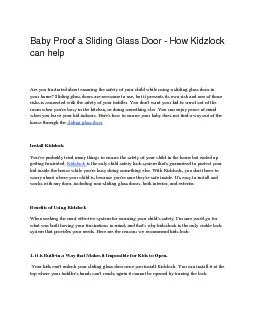PPT-Kids and Technology Technology is a door
Author : giovanna-bartolotta | Published Date : 2018-02-04
into a childs life It is also a tool and like all tools has great benefits when used wisely and appropriately A Few Stats The average 13 to 17yearold exchanges
Presentation Embed Code
Download Presentation
Download Presentation The PPT/PDF document "Kids and Technology Technology is a door" is the property of its rightful owner. Permission is granted to download and print the materials on this website for personal, non-commercial use only, and to display it on your personal computer provided you do not modify the materials and that you retain all copyright notices contained in the materials. By downloading content from our website, you accept the terms of this agreement.
Kids and Technology Technology is a door: Transcript
Download Rules Of Document
"Kids and Technology Technology is a door"The content belongs to its owner. You may download and print it for personal use, without modification, and keep all copyright notices. By downloading, you agree to these terms.
Related Documents













![[DOWNLOAD] I AM Affirmations for Kids, Handwriting Practice book for Kids Ages 6-8 Printing](https://thumbs.docslides.com/1007992/download-i-am-affirmations-for-kids-handwriting-practice-book-for-kids-ages-6-8-printing-workbook-powerful-mindset-training-writing-levels-1-2-growth-kids-affirmation-handwriting-book-for-kids.jpg)
